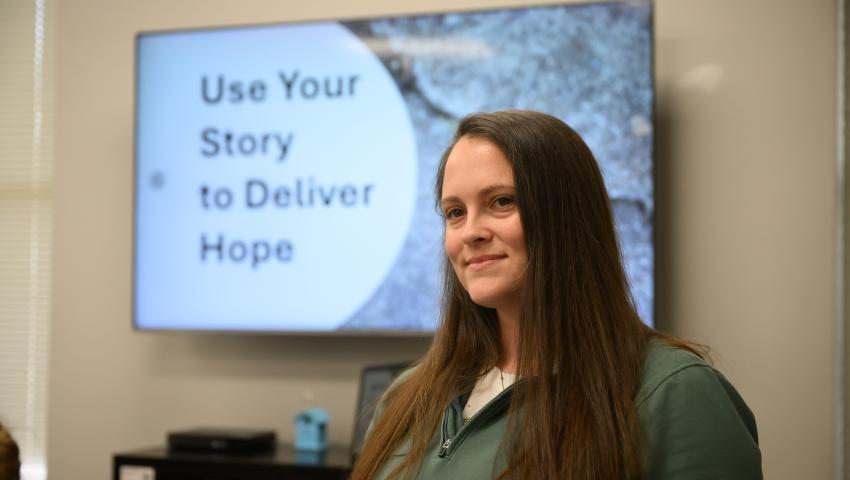
Helping the Helpers: Training Peer Support Specialists in Boundaries and Self-Care
Establishing and maintaining boundaries is essential in any workplace, but for those working in peer support, it is especially critical. Peer support specialists — individuals with lived experience in substance use or mental health recovery who help others identify and pursue recovery goals — often navigate complex relationships where these personal and professional lines meet. In this emerging and evolving profession that requires empathy, understanding, and patience in stressful situations, peer support specialists may encounter ethical dilemmas, emotional burnout, and compassion fatigue.
Recognizing the need for specialized training in this area, the Kentucky Injury Prevention and Research Center (KIPRC) partnered with Voices of Hope, a recovery community organization providing support services for substance use disorder (SUD) in Lexington, Kentucky, to develop Help the Helper: Self-Care, Boundaries, and Empowerment for Peer Support Specialists. This training equips peer support workers with the skills to maintain professional boundaries and prioritize self-care, ultimately strengthening the peer support workforce in Kentucky.
As part of KIPRC’s broader drug overdose prevention efforts, funded through the Centers for Disease Control and Prevention’s Overdose Data to Action program, this initiative supports peer-led recovery services and ensures that individuals in recovery receive the high-quality support and care they need.
Brook West, training coordinator at Voices of Hope, first identified this training need through discussions with peer support specialists who shared stories of navigating workplace challenges without clear guidance.
“I’ve heard many peer support specialists share stories about learning workplace lessons the hard way—not realizing they had broken a rule until they were faced with disciplinary action,” said West.
West brought these concerns to the KIPRC Linkage to Care Strategy Advisory Group, and a survey among peer workers confirmed that self-care and boundaries were top priorities for workforce training. West and the advisory group combined these topics into one comprehensive training that highlights how personal and professional boundaries directly affect self-care and job effectiveness.
Common Boundary Challenges and Recommendations
Unlike many traditional support professions, peer support specialists are encouraged to share their personal recovery stories as part of their role. While this lived experience helps build trust, it can also create gray areas in professional relationships.
“This blurring of lines often leads to boundary issues, such as taking calls from participants outside of work hours or providing financial assistance in ways that go against company procedures,” said West.
“Additionally, the peer support field lacks a standard job description or nationally recognized credentialing body, so expectations vary across organizations and states, creating further confusion.”
The training supports participants in recognizing and establishing both personal and professional boundaries.
Personal boundaries refer to the limits you set to protect your well-being and define how you interact with others. Examples include:
- I'm happy to text daily, but I prefer not to exchange messages more than 20 times an hour.
- I’d love to meet for dinner, but I’ll take my own car so I can leave when I choose.
Workplace boundaries refer to the guidelines that define your responsibilities within your role and help maintain a healthy relationship with your work. Examples include:
- I do not provide transportation to clients, as I am not an authorized driver.
- I only work during my scheduled hours and do not take on tasks outside of that time.
- You may contact me through my office phone, but I do not share my personal phone number.
West hopes the training will reinforce that boundaries are not just rules—they are a form of self-care that ensures that both peer workers and those they serve can thrive.
“Participants and clients deserve the best version of ourselves to receive quality care,” said West. “To this end, we are ethically obligated to care for ourselves. I often remind peer workers to take the same advice they offer their participants—we must respect our limits when helping others.”
Training Success and Future Availability
Feedback from past training sessions has been overwhelmingly positive.
“Every iteration of this training has been wonderful with great engagement,” West said.
After a recent session, one attendee noted that the peer support workforce in Kentucky is still relatively new, and ongoing training in areas like boundaries and self-care is essential for workforce development and retention.
For those interested in receiving the training, Help the Helper is available both virtually and in person. Training materials, including a PowerPoint presentation, Facilitator Guide, and supplemental resources, are accessible on the KIPRC website.
How to Request Training
Organizations and peer support specialists can schedule a session by reaching out via email:
Brook West: brook.west@voicesofhopelex.org
Training Requests: training@voicesofhopelex.org
With continued collaboration between KIPRC and Voices of Hope, this training will remain a valuable resource for peer workers seeking to enhance their effectiveness while safeguarding their own well-being.
KIPRC, a unique partnership between the Kentucky Department for Public Health (DPH) and CPH, serves both as an academic injury prevention research center and as the DPH’s designee or “bona fide agent” for statewide injury prevention and control, focusing on injury prevention translation and practice.
This training is supported by the Centers for Disease Control and Prevention (CDC) of the U.S. Department of Health and Human Services (HHS) as part of cooperative agreement 1 NU17CE010186 totaling $10,814,838 with 0% financed with nongovernmental sources. The contents are those of the author(s) and do not necessarily represent the official views of, nor an endorsement by, CDC, HHS, or the U.S. government. For more information, please visit CDC.gov.